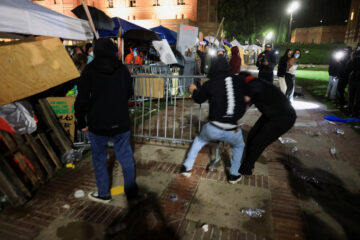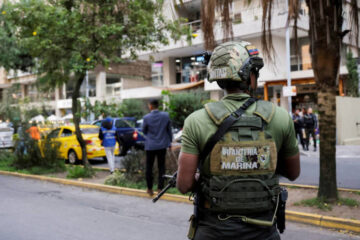Burkina Faso opposition parties, African Union reject army takeover
Reuters
Burkina Faso\’s opposition parties, the United States and the African Union rejected the army\’s seizure of power in the West African country on Saturday after the resignation of President Blaise Compaore, setting the stage for fresh street protests.
The military top brass named Lieutenant Colonel Isaac Zida, deputy commander of the elite presidential guard, as head of state on Saturday. A power struggle within the armed forces was resolved by sidelining the chief of staff.
Zida, who has operational control over the army\’s best trained and equipped unit, had declared himself interim president in an early morning radio address, overruling military chief General Honore Traore\’s claim to lead a transitional government following Compaore\’s departure.
One of Africa\’s long-serving rulers, Compaore stepped down on Friday after two days of mass demonstrations against his attempts to change the constitution to extend his 27 years in power. At least three people were killed after protesters stormed the parliament building and set it on fire.
On the dusty streets of Ouagadougou, the capital, protesters voiced anger that they had driven out Compaore – who seized power in a 1987 military coup – only to have another soldier imposed on them.
"This transition should be democratic and civilian in character," said a statement from a coalition of opposition parties and civil society groups, which called a demonstration in the vast Place de la Nation for Sunday morning.
"The success of the uprising – and therefore the leadership of the transition – belongs to the people and should not be confiscated by the army," it said.
The unfolding crisis in the poor, landlocked nation is being closely watched by the United States and former colonial power France, which were close military allies of Compaore. Under his rule, Burkina Faso became a key ally in operations against al Qaeda-linked groups in West Africa.
The U.S. State Department on Saturday condemned the Burkina Faso military’s seizure of power and urged it to transfer power immediately to civilian authorities. Washington could freeze military cooperation if it judges a coup has taken place.
Under Burkina Faso\’s 1991 constitution, the head of parliament should take office if the president resigns, with a mandate to organize elections within 90 days. However, the army has dissolved the legislature and suspended the constitution.
In a statement issued by military leaders after meeting to appoint Zida to power, they said the form and duration of the transition would be decided in consultation with all sections of society. Troops loyal to Zida patrolled the quiet streets of Ouagadougou on Saturday following his early morning radio announcement that he was taking over as head of state to avoid a descent into anarchy and to ensure a democratic transition.
"This is not a coup d\’etat but a popular uprising," Zida said, dressed in military fatigues, in the studio of BF1 television. "I salute the memory of the martyrs of this uprising and bow to the sacrifices made by our people."
He appealed for the African Union and West African regional bloc ECOWAS to show their support for the transition.
But, in a strongly worded statement, the African Union also called for the military to hand power over to civilian authorities. It said the Peace and Security Council, the arm of the 54-nation bloc that imposes sanctions for violations of democratic process, would discuss the situation on Monday.
"The Chairperson of the (African Union) Commission … stresses the duty and obligation of the defense and security forces to place themselves at the disposal of the civilian authorities who should lead the transition," read the statement.
In the Place de la Nation, the epicenter of this week\’s massive demonstrations, many people voiced anger at what they saw as an attempt by the military to subvert their uprising.
"It\’s ridiculous. It\’s just replacing Blaise with a little Blaise," said Frederic Ouedraogo. "The presidential guard opened fire on the crowd. If were able to get rid of Blaise, then he (Zida) will not be able to stop us. He is going to go, too!"
The events in Burkina Faso will also be carefully followed by other governments in West and Central Africa. Several long-serving leaders are reaching the end of their constitutional terms in several countries in the region, including Benin, Congo Republic and Democratic Republic of Congo.
The government of neighboring Ivory Coast said on Saturday that Compaore had arrived there with his family and entourage but did not specify his location. Military sources said he was staying at a presidential retreat in the coastal resort of Assinie, to the east of the economic capital, Abidjan.
It was the seventh time that a military officer had taken over as head of state in Burkina Faso since it won independence from France in 1960. It was previously known as Upper Volta.
Troops loyal to Zida deployed at strategic points across the capital on Saturday night, though an evening curfew was pushed back by three hours to 2200 GMT (1800 EDT). The airport was also reopened. Land borders remained closed.
Despite being one of the world\’s poorest nations, Burkina Faso positioned itself as a key mediator in regional crises under the stewardship of the imposing Compaore, popularly known as \’Handsome Blaise\’, who was renowned as a skilled negotiator and a wily, ruthless politician.
A taciturn former soldier who had survived several bids to oust him after he seized power in a 1987 military coup, Compaore initially sought to defy the calls for him to step down once the protests turned violent on Thursday.
Diplomats said Compaore – widely blamed for the death of his friend, the leftwing revolutionary Thomas Sankara, in the 1987 coup – was alarmed at the possibility of prosecution on rights charges if he left office.
But his bid to cling to the presidency – and its lavish trappings – angered many young people in a country stagnating in 183rd place out of 186 countries on the U.N. human development index. With an average age of less than 18, most of the country\’s 17 million population have never known another leader.
Crowds danced, cheered and blew whistles in Place de la Nation on Friday after Compaore\’s resignation, before the army announced it was taking charge.
"This is a \’sub-Saharan Spring\’ and it must continue against all the presidents who are trying to hang on to power in Africa," said law student Lucien Trinnou on Friday, referring to the Arab Spring that toppled several long-term leaders.
Source: Reuters
[do_widget_area inner_adsbar]









